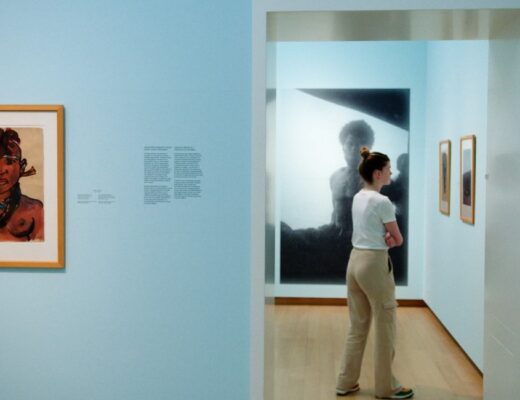A snakeskin tube top and cowboy hat. A belt worn on a bare midriff, above the belly button. And, of course, the famous white tutu. Who but the inimitable Patricia Field could come up with these bizarre, divisive, and now-iconic outfits? As a stylist and costume designer, the former NYC club kid is known for putting together ensembles from wildly disparate pieces that have no business looking good together — “until they do,” as actor Michael Urie explains. Her secret? They have to make her happy.
Michael Selditch’s aptly named documentary, Happy Clothes: A Film About Patricia Field, surveys the stylist and costume designer’s 50-over year career through interviews with Field, now 81, and her collaborators, assistants, and celebrity fans. With her flaming red hair and pack-a-day rasp, Field’s own demeanor and physical appearance is as unmistakable as her on-screen outfits: kooky, arresting, and unapologetic. Since her parents owned a dry cleaner shop, she grew up surrounded by clothes and developed a knack for business. She first made her mark during lower Manhattan’s grimy, glamorous heyday in the 70s and 80s, where she befriended soon-to-be divas like Amanda Lepore, Laverne Cox, and Candis Cayne. Many of them worked at or patronized her eponymous boutique (archival footage includes an interview with a baby-faced RuPaul waxing poetic about rhinestones), which was a magnet for celebs like Madonna and Cyndi Lauper as well as NYC’s misfit underbelly. After decades nurturing drag queens, clubbers, and artists like Keith Haring and Basquiat, Field sold her store to focus on styling Hollywood and the silver screen.
Selditch opens the documentary by discussing Field’s most recent costume design collaborations, the shows Emily in Paris and Run the World. These segments are interesting mostly because they’re appetizers for the main course, which is, of course, Sex and the City. Over the course of six seasons and two feature films, Field’s sartorial bravado perfectly aligned with her stars’ fashion fearlessness, and the results have spawned a cultural afterlife that includes a viral Instagram account, podcast, book, and live events celebrating “Every Outfit on Sex and the City.” Interviews with Kim Cattrall and Sarah Jessica Parker, who played glamorous sexpot Samatha Jones and journalist Carrie Bradshaw, who’d famously rather have Vogue than dinner, are filled with genuine affection and admiration. With actors Kristin Davis and Cynthia Nixon rounding out the show’s stars, Field created four women whose wardrobes so encapsulated their personalities that they transformed from memorable characters to near-universal archetypes. As such, she considers herself more of a stylist than a costume designer, since she’s as much attuned to the actor as the character they’re playing. The idea of trust is a recurring theme, and Field recognizes that clothes are probably the easiest way for a person to make themselves vulnerable to judgment from friends and strangers alike. As the interviews make clear, part of her success is the way she builds trust — and eventually confidence — with her actors, even as she puts them in ensembles that have literally never been seen before or since.
Interviews with Ugly Betty’s Michael Urie and Vanessa Williams further expound on Field’s idiosyncratic vision, especially contrasting her wacky, colorful work in later seasons against the safer choices made by the show’s first costume designer (actress America Ferrera, the titular Betty, is unfortunately not featured). And there’s an all-too-short pit stop to discuss The Devil Wears Prada, for which Field received an Oscar nod for Best Costume Design. Being newer shows, Emily in Paris and Run the World (which is explicitly described as a “a Black girl’s Sex and the City) haven’t quite developed the same cultural cachet as Field’s other projects — yet. In the last segment of the film, Field and her assistants are in a costume fitting with one of Run the World’s stars, Bresha Webb. As Field mixes and matches a dizzying array of skirt suits, thigh-high fishnet boots, bolero jackets, and patent leather accessories, it’s clear that her singular vision doesn’t rely on trends and never has. Instead, every seemingly outlandish combination or clash of patterns and textures comes down to one thing: whether it makes her happy. Given the current obsession with “quiet luxury” and prestige labels’ insistence on peddling endless swathes of five-figure beige, what’s more flattering than exuberant colors, riotous patterns, and unabashed joy?
Published as part of InRO Weekly — Volume 1, Issue 24
Enjoy our content? Want early access to features, interviews, and more? Support us on Patreon!







